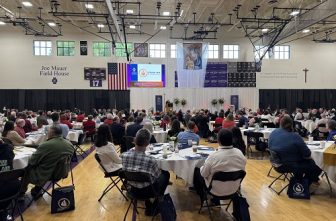 Political commentator David Brooks recently wrote a thought-provoking column in The New York Times — one that should give Americans pause about where our country and culture are headed.
Political commentator David Brooks recently wrote a thought-provoking column in The New York Times — one that should give Americans pause about where our country and culture are headed.
But it also serves as a confirmation that the Catholic Church is headed in the right direction with its call for a new evangelization, one that challenges us to witness to Gospel values in a world in need of more hope, more virtue and more focus on the common good.
Window on the culture
A few years ago, Brooks wrote, Google released a database of more than 5 million books published between the years 1500 and 2008. A number of researchers have examined that database to see how frequently different words were used at different times in history. Such use, the researchers speculated, might reveal trends within the culture.
One research team’s analysis, Brooks said, points to a “rising individualism.” Between 1960 and 2008, he said, “words and phrases like ‘personalized,’ ‘self,’ ‘standout,’ ‘unique,’ ‘I come first’ and ‘I can do it myself’ were used more frequently. Communal words and phrases like ‘community,’ ‘collective,’ ‘tribe,’ ‘share,’ ‘united,’ ‘band together’ and ‘common good’ receded.”
Another study found that “general moral terms like ‘virtue,’ ‘decency’ and ‘conscience’ were used less frequently over the course of the 20th century. Words associated with moral excellence, like ‘honesty,’ ‘patience’ and ‘compassion’ were used much less frequently.”
Fifty words associated with “moral virtue” faced a similar depressing fate: Some three-quarters were used less frequently over the course of the 20th century — words like “bravery,” “thankfulness,” “modesty,” “humbleness,” “kindness” and “helpfulness.” So were words like “faith,” “evil” and “prudence.”
It’s possible, as Brooks admits, that drawing the conclusion from this research that Western culture is more focused than it once was on individualism and less on time-tested virtues and moral values might be reading too much into the data, which show how often certain words have been used but not the context in which they appear.
But there is plenty of other evidence to suggest that the studies are, indeed, revealing a cultural transformation that is happening around us.
The gap between the “haves” — striving to have more and more in the false hope that it can bring happiness — and the “have nots,” who struggle every day in the face of poverty, continues to widen in our country and around the world.
The happiness of individual adults is now supplanting what’s best for children and the common good in more and more states, including Minnesota, where traditional marriage is being redefined rather than strengthened.
Words like “truth,” “right” and “wrong” that once shared a broad understanding, are quickly dismissed today in public debates and arguments as subjective and unhelpful. In a world of moral relativism, the argument goes, who’s to say what’s true, right and wrong?
Call to engagement
This is why we Catholics — who believe in the values inherent and long-understood in words and phrases like “faith,” “truth” “hope,” “love” “virtue” “community” and “the common good” — need to engage the larger culture around us. We need to be the salt for a society that is turning into itself and losing its ability to add the kind of flavor that enriches the culture.
As Catholics, we shouldn’t view the researchers’ findings as bad news. We should view it rather as a challenge — one that requires us to live out our values and beliefs in our communities and in the broader public square. The world is in need of some evangelization, and we need to be at the forefront of the effort to change the direction in which our culture is heading.




